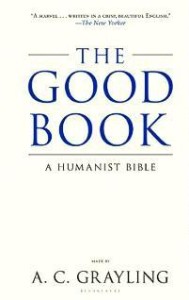“The Good Book”
by R.J. Snell
Filed under Book Reviews
The Good Book: A Humanist Bible
by A.J. Grayling
Houghton Mifflin , 352 pages, 1998
In its marketing campaign, The Good Book: A Humanist Bible was presented as something akin to the emancipation of Daedalus and Icarus in their winged escape from Crete. Just as Daedalus refused to obey the tyrannical King Minos and secured freedom for himself and his son, so our hero, the prominent atheist A. C. Grayling, has refused to obey false authority and freed himself and his readers from the tyranny of religion. Grayling, we were breathlessly informed, spent years choosing and rewriting those venerable texts of humanistic wisdom free of all divine authority. Plato, Aristotle, Epicurus, Epictetus, Cicero, Plutarch, Bacon, Hobbes, Hume, and Locke, all compiled into the master text of the humanist scripture and all boldly proclaiming Grayling’s motto of enlightenment: “Dare to know.”
 The “temerity” of the book is furthered by the editorial choice to mimic the structure and genres of Scripture, including the chapter-and-verse format, and so provide a “secular alternative to the King James Bible.” The text is arranged into fourteen sections claiming to provide everything found in Scripture: Genesis, Wisdom, Parables, Concord, Lamentations, Consolations, Sages, Songs, Histories, Proverbs, The Lawgiver, Acts, Epistles, and The Good. This “book of extraordinary audacity,” the dust jacket claims, was not compiled by Grayling so much as “made” using the very “techniques of editing, redaction, and adaptation that produced the holy books of the Judeo-Christian and Islamic religions.”
The “temerity” of the book is furthered by the editorial choice to mimic the structure and genres of Scripture, including the chapter-and-verse format, and so provide a “secular alternative to the King James Bible.” The text is arranged into fourteen sections claiming to provide everything found in Scripture: Genesis, Wisdom, Parables, Concord, Lamentations, Consolations, Sages, Songs, Histories, Proverbs, The Lawgiver, Acts, Epistles, and The Good. This “book of extraordinary audacity,” the dust jacket claims, was not compiled by Grayling so much as “made” using the very “techniques of editing, redaction, and adaptation that produced the holy books of the Judeo-Christian and Islamic religions.”
The book is better than the cover. While the marketing presents the author as provocateur, one finds instead the reflections of a decent, middle-aged man with a thorough education, now thinking about his loves and aspirations in light of the erosive power of time. Grayling ignores religion more than he attacks it. Rarely, and lamely, he swipes at the ignorant who should “go to the illusionists, then, and leave philosophers in peace.” And while at times he mocks the fear of sex supposedly endemic to the religious, he does not make the heart race with anger or lust: “Why do you blush to hear the praise of pleasure, when you do not blush to indulge its temptations under cover of night?”
Wild stuff, that. All in all, Grayling seems less like a Daedalus and more like an amiable chap who prefers Cicero to St. Paul but who would be good to have over for dinner or a round of golf.
He is quite good in his use of the ancients, particularly the Stoics and their understanding of the deceptions of money, honor, and reputation. In his paraphrase of Cicero’s On Friendship, for instance, he ably discusses the remarkable quality of friendship between those who “want nothing and . . . feel absolutely self-dependent” as opposed to friendship cultivated merely for its material benefits—with harsh conclusions about the possibility of politicians having friends. But such passages were just interesting enough to make me want to read the original. I found myself, quite often, putting down the Good Book to turn instead to the great books Grayling paraphrases.
Read the rest of the review.
Related Posts
Note: Our goal is to cultivate serious and respectful dialogue. While it's OK to disagree—even encouraged!—any snarky, offensive, or off-topic comments will be deleted. Before commenting please read the Commenting Rules and Tips. If you're having trouble commenting, read the Commenting Instructions.












